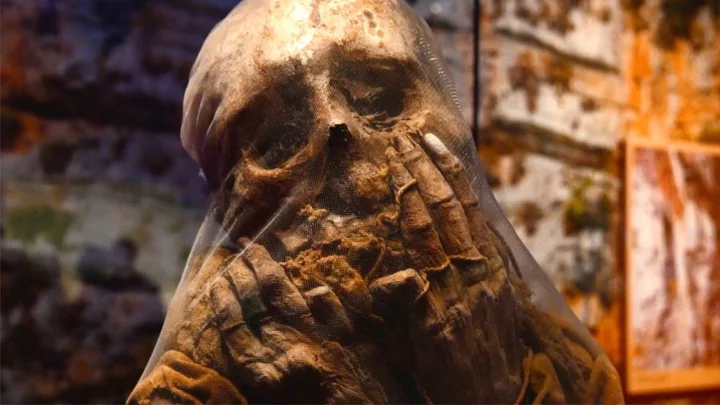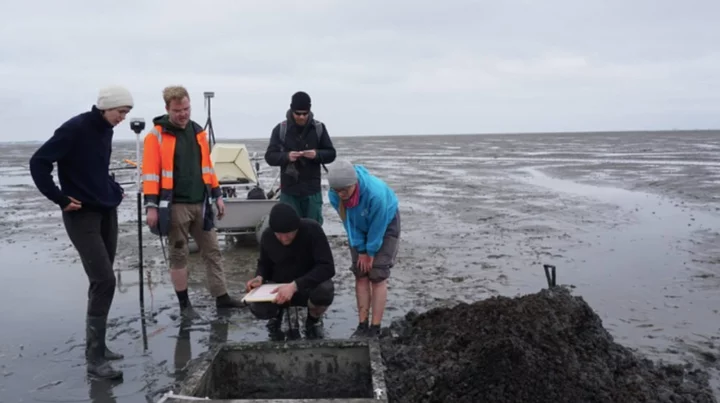
Scientists have discovered the 'largest mummy workshop' ever
Archeologists in Egypt have discovered what they have called "the largest and most complete" mummification workshop ever at a site near Cairo. As reported by The Telegraph, the site dates back to the 4th century and the 30th Dynasty in the early Ptolemaic era and is near the oldest stone pyramid in Egypt, Djoser's Step. Mostafa Waziri, the secretary general of Egypt’s supreme council of Antiquities is quoted as saying: "Two stone beds for human embalming were found in a number of rooms. The beds were approximately two metres long and one metre wide. They were made of stone blocks and covered with a layer of mortar that sloped down to a gutter. "The mummification beds were used to prepare the body by extracting the human organs, which were placed in canopic jars that were discovered." Sign up to our free Indy100 weekly newsletter The mud brick site, which was only used for humans, reportedly contains two embalming beds, body organ tools, linen rolls and canopic jars. In a separate workshop, which was dedicated to mummifying just animals, bronze tools were found as well as five limestone beds. Other artifacts that were found were intact wooden and stone statues, funerary objects as well as inscriptions on the tomb walls about various activities including hunting. Perhaps the most interesting element of the find were two tombs believed to belong to high-ranking officials and priests that had been carved into stone. Experts at the site predict that the two tombs are 4,400 and 3,400-year-old respectively. This comes after scientists in Germany found the remains of a lost city dubbed 'the Atlantis of the North Sea' which was swept away by waves more than 600 years ago. Have your say in our news democracy. Click the upvote icon at the top of the page to help raise this article through the indy100 rankings.
2023-05-30 00:28

Elon Musk says Twitter has 'no actual choice' about government censorship requests
Criticized for giving into governments' censorship demands, Elon Musk on Sunday claimed that Twitter has "no actual choice" about complying those requests.
2023-05-29 22:47

The world's biggest ad agency is going all in on AI with Nvidia's help
WPP, the world's largest advertising agency, has teamed up with chipmaker Nvidia to create ads using generative artificial intelligence.
2023-05-29 21:28

Musk expected to visit China this week, meet officials - sources
HONG KONG/SHANGHAI Tesla Chief Executive Elon Musk is expected to visit China this week, three people with knowledge
2023-05-29 20:20

Nvidia to build Israeli supercomputer as AI demand soars
By Steven Scheer JERUSALEM Nvidia Corp said on Monday it was building Israel's most powerful artificial intelligence (AI)
2023-05-29 19:58

'Bizarre' footage captures moment an octopus wakes up from a 'nightmare'
Rare footage of an octopus having a 'nightmare' has been captured and it is fascinating scientists who study the creatures. The footage comes courtesy of The Rockefeller University in New York where an octopus named 'Costello' was studied for 24 hours a day in a laboratory. In papers published by bioRxiv, they found that on at least four occasions the octopus woke up abruptly and began flailing its tentacles, changing colour, shooting black ink into the water and displaying "antipredator and predatory behaviors." The experts put this behaviour down to temporary stress which they believe was likely caused by a bad dream or even a memory from a previous traumatic moment. Sign up to our free Indy100 weekly newsletter Speaking to LiveScience, Eric Angel Ramos, a postdoctoral researcher at the University of Vermont said: "It was really bizarre because it looked like he was in pain; it looked like he might have been suffering, for a moment. And then he just got up like nothing had happened, and he resumed his day as normal." Compilation of the four abnormal sleep-associated episodes documented in a male Octopus insularis. www.youtube.com One thing the scientists did note is that when Costello arrived in the lab he appeared to be recovering from several severe injuries having lost the majority of two of his tentacles following an attack. When suggesting that Costello could have been dreaming about the attack the scientists noted: "can result in long-term behavioral and neural hypersensitivity." There has also been suggestions from Robyn Crook an associate professor of biology at San Francisco State University, who was not involved in the study, that Costello's behaviour could be down to something called senescence, which is when an octopus' body begins to break down before their death. Ramos concluded that he could not "exclude that senescence could be one of the drivers of this." This is not the first time footage of this nature has been captured. Back in 2019, PBS shared incredible footage of an octopus changing colour while it appeared to be dreaming. Have your say in our news democracy. Click the upvote icon at the top of the page to help raise this article through the indy100 rankings.
2023-05-29 16:19

Smartwatch Maker in Talks to Raise Funds to Expand India Push
Smartwatch brand Noise is in talks for its first-ever fundraising round, as it competes for the top spot
2023-05-29 15:27

Elon Musk reacts angrily to criticism for giving in to governments’ Twitter censorship demands
Twitter boss Elon Musk, who has often touted himself as a champion of free speech, said he had no "actual choice" when accused of caving in to censorship demands made by authoritarian governments. Since the billionaire's takeover in October last year, Twitter has approved 83 per cent more censorship requests from governments such as Turkey and India, El Pais reported. The company reportedly received 971 requests from governments, fully acceding to 808 of them and partially acceding to 154. The year prior to Mr Musk taking control, Twitter agreed to 50 per cent of such requests, which was in line with the compliance rate indicated in the company’s last transparency report. The report, shared by Bloomberg columnist Matthew Yglesias, evoked an angry reaction from Mr Musk. Mr Yglesias tweeted the report with the caption "I’m a free speech absolutist", quoting the Twitter boss. The world's second-richest person shot back, writing: "You're such a numbskull. Please point out where we had an actual choice and we will reverse it." The columnist responded: "Look, I’m not the one who bought Twitter amidst a blaze of proclamations about free speech principles. "Obviously you’re within your rights to run your business however you want." Mr Musk has repeatedly reiterated his backing for free speech both before and since the $44bn acquisition of Twitter. The “absolutist” quote refers to a tweet in March 2022 in the wake of Vladimir Putin’s unprovoked invasion of Ukraine. "Starlink has been told by some governments (not Ukraine) to block Russian news sources. We will not do so unless at gunpoint," Mr Musk tweeted. "Sorry to be a free speech absolutist." Yet Twitter has been accused of helping incumbent Turkish president Recep Tayyip Erdogan stifle criticism by blocking several accounts in the two days before the country’s hotly contested general election. “In response to legal process and to ensure Twitter remains available to the people of Turkey, we have taken action to restrict access to some content in Turkey today,” Twitter’s global government affairs announced, without explaining which tweets would be blocked. Following severe criticism, Mr Musk alleged Twitter has “pushed harder for free speech than any other internet company, including Wokipedia”. Earlier this year in India, Twitter complied after Narendra Modi’s government used emergency powers to ban content related to a BBC documentary on social media. The two-part documentary included a previously unpublished report from the UK Foreign Office that held Mr Modi “directly responsible” for the “climate of impunity” that enabled communal violence in Gujarat state. The riots in February 2002 killed over 1,000 people – most of them Muslims – while Mr Modi was chief minister of the state. Justifying the consent Mr Musk said: "The rules in India for what can appear on social media are quite strict, and we can’t go beyond the laws of a country." He said doing so would put his staff at risk. “If we have a choice of either our people going to prison or us complying with the laws, we will comply with the laws.” Read More Elon Musk tweets quote by neo-Nazi wrongly attributed to Voltaire Erdogan declared winner of Turkey presidential run-off – extending his 20 years in power India uses emergency powers to ban anyone from sharing clips of BBC Modi documentary Elon Musk tweets quote by neo-Nazi wrongly attributed to Voltaire Elon Musk’s Neuralink brain chip company gets FDA approval for human testing AOC jokes more people watched her gaming online than listened to DeSantis launch
2023-05-29 13:21

Arm rolls out new smartphone tech and MediaTek signs up to use
By Jane Lanhee Lee and Stephen Nellis Arm Ltd on Monday rolled out new chip technology for mobile
2023-05-29 09:23

Singapore's Temasek cuts compensation for those responsible for FTX investment
Singapore state investor Temasek Holdings said on Monday it had cut compensation for the team and senior management
2023-05-29 07:24

Europe's 'City of Atlantis' discovered after being lost for 600 years
The remains of a church from a sunken town known as the 'Atlantis of the North Sea' has been discovered beneath the mud on Germany's coast. The church is believed to be part of a site called 'Rungholt' located in the Wadden Sea. The town, which was previously thought to be a local legend, has not been seen since 1362 after it was submerged beneath the waves during an intense storm. However, new research has shown that the town really did exist and that they had built reinforcements around the settlement to protect them from the severe elements. The research was carried out on the area by archeologists from Kiel University, Johannes Gutenberg University Mainz, the Center for Baltic and Scandinavian Archaeology, and the State Archaeology Department Schleswig-Holstein. Sign up to our free Indy100 weekly newsletter Searching the Wadden Sea which is the longest stretch of intertidal sand and mud flats on Earth, the team, using geophysical imaging technology found man-made mounds that had been constructed to protect the town against the tides. Amongst this structure were the foundations of a building which the team determined had to be a church which may have been the location of the town centre. In a statement, Dr. Dennis Wilken, a geophysicist at Kiel University of Kiel University said: "Settlement remains hidden under the mudflats are first localized and mapped over a wide area using various geophysical methods such as magnetic gradiometry, electromagnetic induction, and seismics." Dr. Hanna Hadler from the Institute of Geography at Mainz University added: "Based on this prospection, we selectively take sediment cores that not only allow us to make statements about spatial and temporal relationships of settlement structures, but also about landscape development." Dr. Ruth Blankenfeldt, an archaeologist at ZBSA also suggested that the "special feature of the find lies in the significance of the church as the centre of a settlement structure, which in its size must be interpreted as a parish with superordinate function." The storm that washed away Rungholt has gone down in history as one of the largest to ever hit the region, affecting not just Germany but also the Netherlands, Denmark and the UK. The storm happened on January 1362 and has since been referred to as "the great drowning of men." According to historical reports, Rungholt was once a busy trading port for fishermen but was also populated by taverns, brothels and churches. Have your say in our news democracy. Click the upvote icon at the top of the page to help raise this article through the indy100 rankings.
2023-05-28 19:19

Scientists might have discovered a simple way to stop the ageing process
The feeling of hunger could be a simple way to stop the ageing process, according to a new study. Researchers at the University of Michigan tricked fruit flies into feeling hungry which resulted in the insects living longer – even when they eat their calorie intake. The study - published in Science - suggests that the perception of insatiable hunger alone can generate the anti-aging effects of intermittent fasting. (And since it’s the perception rather than actual hunger, it means the bugs don’t actually have to starve). Sign up to our free Indy100 weekly newsletter "We've sort of divorced [the life extending effects of diet restriction] from all of the nutritional manipulations of the diet that researchers had worked on for many years to say they're not required," physiologist Scott Pletcher said, as per Michigan Medicine. "The perception of not enough food is sufficient." You may have heard the term intermittent fasting before, as it is a popular diet fad that consists of going for extended periods of time without eating, followed by a period of eating normally, according to Bupa. Despite its popularity, evidence supporting its benefits is limited in terms of research on humans. Perhaps you’re thinking… why fruit flies? Well, the insects actually share 75 percent of the same disease-related genes as us, while also sharing similar qualities to mammals in terms of their metabolisms and brains, according to Science Alert. In the research, branched-chain amino acids (BCAA) essential nutrients that appear to trigger feelings of fullness in flies when consumed, were used. The fruit flies maintained their hunger through getting fed snacks low in BCAA and their hunger was noticed through how much the insects ate from a buffet of food hours after eating the snack. More food was consumed by flies who earlier ate a low-BCAA snack, and they choose protein over carbs, focusing on what their hungry bodies needed. From learning this, the team directly activated the neurons in fruit flies that trigger hunger responses, they found these hunger-stimulated flies also lived longer. "Demonstration of the sufficiency of hunger to extend life span reveals that motivational states alone can be deterministic drivers of ageing," Pletcher and colleagues wrote in the findings. Along with fruit flies, rodents have also been part of the study and both seems to suggest calorie restriction can extend life and is good for our health too. Though of course, more extensive research is required to see whether or not this is also the case with humans. Have your say in our news democracy. Click the upvote icon at the top of the page to help raise this article through the indy100 rankings.
2023-05-28 01:26
